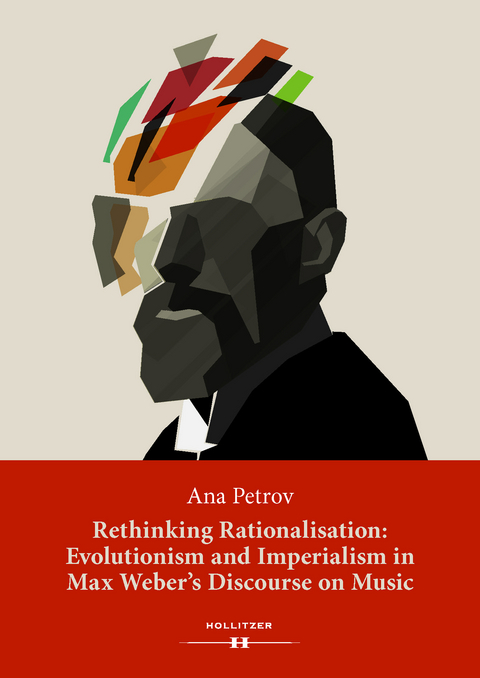Rethinking Rationalisation: Evolutionism and Imperialism in Max Weber's Discourse on Music.
Hollitzer Wissenschaftsverlag
978-3-99012-267-9 (ISBN)
Max Weber as a sociologist of music?Scrutinising an array of nineteenth-century discourses on the concept of 'development' in music, Ana Petrov focuses on Max Weber's theory of rationalisation in music, which led him to see 'rationalised' music as the most 'developed', the most 'complex' and the 'best' music that the whole of civilisation had ever achieved. Weber was convinced that his analysis could prove that the 'peak' of the rationalisation process was to be found in the 'great' masterpieces of German composers, starting with Johann Sebastian Bach and finishing with Richard Wagner. Petrov argues that Weber's allegedly 'neutral' concepts were far from 'innocent' and 'ideology-free', but rather outcomes of his social and intellectual background. She explores the implications of Weber's concept of rationalisation in music, discussing correlations between the theories of evolution and rationalisation and the paradigm of cultural imperialism, which can be recognised in Weber's promulgation of the superiority of Western music traditions.
Ana Petrov (b.1982) is a sociologist and musicologist. An assistant professor at the Faculty of Media and Communications, Singidunum University, Belgrade, she is also the author of books on Pierre Bourdieu and Bruno Latour, as well as articles dealing with Max Weber’s theory of rationalisation, Friedrich Nietzsche’s musical aesthetics, the public concert as social event, and popular culture in the former Yugoslavia. Her research interests and publications lie at the intersections of the aesthetics of music, sociology of culture, sociology of music, and sociology of the body.
Contents
Foreword
Introduction: Max Weber as a Sociologist of Music?
The Study of Music and Weber’s Sociology of Culture
The Period Before 1910
The Period After 1910 and the First Meeting of the Deutsche Soziologische Gesellschaft (German Sociological Society)
Components of Weber’s Sociology of Music
The Concept of Geist (Spirit) of Modern Art
The Concept of the Rationalisation of Art
Theoretical Approaches to Weber’s Discourse on Music
Researching Weber’s Theory
Reading Evolutionism in Weber’s Theory
Evolutionism in Nineteenth-Century Scientific Discourse
Herbert Spencer’s Theory of Evolution
Evolution as Progress
Evolution as Racial Differentiation
Charles Darwin’s Theory of Evolution
Selection and Evolution
Extermination as an Inevitable Consequence of Selection in the Evolutionary Process
Spencer’s and Darwin’s Discourse on the Evolution of Music
Spencer and Darwin on the Role of Music in Evolution
Spencer’s Theory on the Origin of Music: Music as ‘Natural Language of Emotion’
Spencer’s Theory on Development from Homogeneous Towards Heterogeneous Species: The Path from ‘Primitive’ to the ‘Civilised’ Music
Darwin’s Theory on the Origin of Music: Voice as a Means for Attraction in Sexual Selection
Darwin’s Thesis on Music as Emotional Expression
Evolutionism in Nineteenth-Century Discourses on Music
The Influence of Evolutionist Theories on Discourses on
The Construction of Scholarly Discourses on Music
The Incorporation of Evolutionism in Discourses on Music
Deconstructing Scholarly Discourses on Music
The Concepts of ‘Developed’ and ‘Undeveloped’ Musics
The Science of Music as the Investigation of Tone Species’ Evolution: The Case of Adler
The Science of Music as a Natural Science: Helmholtz and Riemann
The Concepts of Western and Non-Western Musics
Implications of the Musicological Discourse on Progress: Constructing the Field of ‘Primitive’ Music
Comparative Musicology as an Alternative Discourse on Music (Or a Discourse on Other Musics)
Evolutionism in Weber’s Discourse on Music
The Influence of Evolutionist Musicological Discourses on Weber’s Concept of Music Rationalisation
Dealing with Acoustics: Dialogue with Helmholtz’s Theory
The Inf luence of the Music Theory Discourse: Incorporation and Modifications of Deconstructing Scholarly Discourses on Music
Incorporation into the Discourse of the History of Music as a Positivist Science on Written Works of Art
Complete Incorporation into the Nineteenth-Century Musicological and Ethnomusicological Discourses: ‘Developed/Undeveloped’ and ‘Western/Non-Western’
Dichotomies
Rationalisation as an Imperialistic Evolutionist Model of Constructing Music History
The First Evolutionist Symptom: ‘Development’ of the Intervals from the ‘Simpler’ Forms to the Increasingly ‘Complex’ and Continuous ‘Progress’ of Tonal
Species
The Second Evolutionist Symptom: Struggle and Selection in the Field of Professional Music
Rationalisation as Progress
Development, Progress, Evolution, Rationalisation
Concept of Style as the Final Answer in the Problematisation of Progress in Weber’s Theory of Rationalisation of Music
Conclusion: Implications of Weber’s Discourse on Rationalisation of Music
Decolonising Weber: Mapping Weber’s Theory in the Debate on Imperialism
Foundations for Problematisation of Imperialistic Discourse on Music Evolution: Musicological Readings of Weber
Bibliography
Index
Curriculum Vitae
| Erscheinungsdatum | 18.02.2016 |
|---|---|
| Sprache | englisch |
| Maße | 175 x 245 mm |
| Gewicht | 516 g |
| Themenwelt | Geisteswissenschaften ► Geschichte ► Geschichtstheorie / Historik |
| Geschichte ► Teilgebiete der Geschichte ► Kulturgeschichte | |
| Schlagworte | Charles Darwin • Geschichtsforschung: Quellen • Geschichtsschreibung, Historiographie • Johann Sebastian Bach • Max Weber • Mitteleuropa • Musiksoziologie (Weber) • Rationalisation • Richard Wagner • Sozial- und Kulturgeschichte • Weber, Max |
| ISBN-10 | 3-99012-267-3 / 3990122673 |
| ISBN-13 | 978-3-99012-267-9 / 9783990122679 |
| Zustand | Neuware |
| Haben Sie eine Frage zum Produkt? |
aus dem Bereich




